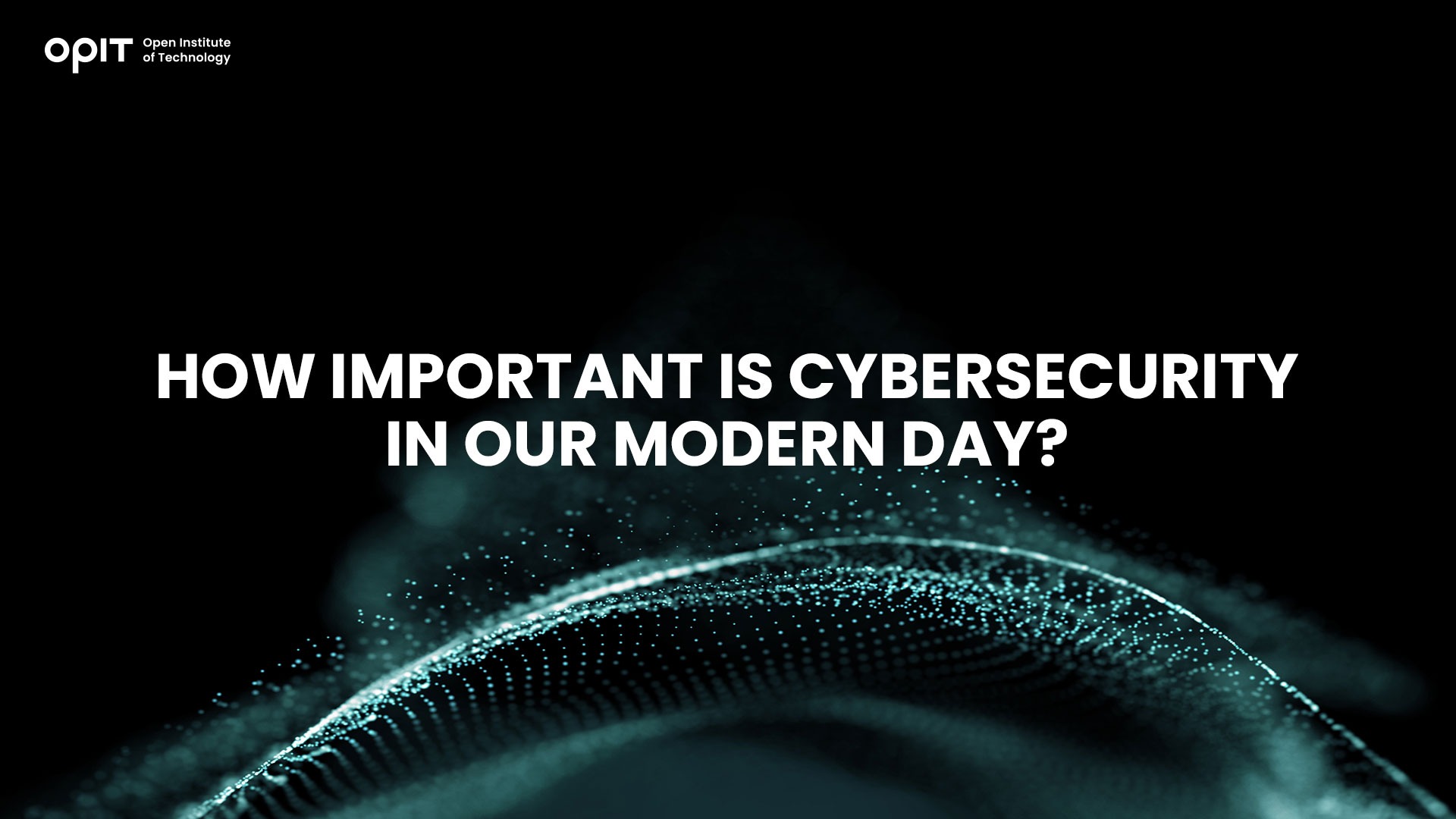Read the full article below (in Italian):


In the digital age, virtually every aspect of people’s lives is connected through digital channels. On the positive side, this allows instant communication and information access, as well as global connectivity. But this connectivity also introduces a myriad of risks, with cybersecurity threats chief among them.
In such an environment, protecting sensitive information and critical infrastructure has never been more crucial. And yet, the cybersecurity industry is short 4 million workers.
That’s why we invited Tom Vazdar, the program chair of the Master in Enterprise Cybersecurity program at the Open Institute of Technology (OPIT), to shed light on cybersecurity’s critical role in safeguarding our interconnected world. Professor Vazdar will also walk us through the Enterprise Cybersecurity Master’s program at OPIT, explaining what makes it stand out among similar programs.
With extensive experience in various industries (like finance and manufacturing) and countless successful cybersecurity strategies, risk management frameworks, and compliance initiatives under his belt, Professor Vazdar is truly the one to consult. His take on the pressing challenges (and solutions) within the cybersecurity field is invaluable for future students and those already in the industry.
The Current State of Cybersecurity
As Professor Vazdar puts it, “We are living in an era where digital transformation is accelerating.” So, it’s not surprising that new trends (and challenges) continue to emerge in the field. Here’s what Professor Vazdar has to say about them.
Cyberattacks Are Increasing
According to the ISACA’s 2023 State of Cybersecurity report, 48% of organizations reported an increase in cyberattacks compared to the year prior. Professor Vazdar says that this primarily has to do with the increasing complexity of cyberthreats. Simply put, organizations can’t keep up with the escalating sophistication of these threats, resulting in their increased frequency.
But there’s another element to this alarming increase in the number of cyberattacks – a lack of transparency. You see, Professor Vazdar claims that many organizations are believed to underreport cyberattacks. Such underreporting might be due to concerns about reputational damage or regulatory consequences. Either way, it’s exceptionally harmful to the industry, as it hinders the ability to collaborate on developing effective countermeasures and strengthening collective cybersecurity defenses.
Cybersecurity Lacks Workers
As previously mentioned, the cybersecurity industry is experiencing a severe staffing challenge. Interestingly, this doesn’t mean the number of cybersecurity professionals is decreasing. It’s quite the opposite, really.
In 2023, the global cybersecurity workforce grew 8.7% to reach 5.5 million people, a record high. And yet, another 4 million professionals are needed to meet the escalating demand for cybersecurity. If there has ever been a stat to prove just how critical cybersecurity is, this undoubtedly does it.
New Technologies Are Constantly Adopted
Artificial intelligence. Machine learning. Cloud computing. Internet of Things. Blockchain technology. These are just some of the technologies Professor Vazdar singles out as transformative forces reshaping cybersecurity.
On the one hand, these technologies have the power to enhance threat detection and cybersecurity response. On the other, they can also introduce new vulnerabilities and threats, such as data poisoning. The worst part? We’ll let Professor Vazdar explain it:
“All of this has come in a really short period of time, and we, as people, are actually struggling to learn about all these new technologies.”
That’s why he emphasizes the need for continual education in the field, as this is the only way to stay ahead of the curve.
Cybersecurity Strategies Are Becoming Proactive and Predictive
Here’s how it used to be in the cybersecurity world, according to Professor Vazdar: A new massive threat would emerge every few years, affecting the whole world. In the aftermath, you would scramble a team together and work tirelessly for a few days to develop a patch or a solution.
As you can imagine, this approach is hardly viable in today’s oversaturated cybersecurity landscape. That’s why “we’re seeing a shift toward more proactive and more predictive security strategies,” as Professor Vazdar puts it.
Cyberpsychology Is Gaining Importance
Cyberpsychology is by no means a new concept. According to Professor Vazdar, this term was first used in 2008 by Professor Zheng Yan. However, its significance has grown exponentially in recent years. This field of study shifts the focus from the cyberthreat to the cyberattacker.
Its goal is to understand what these malicious actors are doing and why. The result? “We, as humans, know how to defend [ourselves].”
According to Professor Vazdar, this is the third (and most important) layer of defense against cyberthreats. The first concerns the physical environment (i.e., the computer and information systems), while the second is a logical layer that “connects everything together.”
No One Is Immune to Cyberthreats
There’s a common misconception that smaller organizations and individuals aren’t “appealing” to hackers and other malicious actors. However, this couldn’t be further from the truth. No one is immune to cyberthreats, as cybercriminals always have something to gain (regardless of the target’s size or perceived importance).
That’s why investing in cybersecurity is crucial, whether you work for a small IT team or a huge company or just use technology in your day-to-day life.
Why Continuous Education Matters in Cybersecurity
There’s no doubt about it – cybersecurity should be a top priority for everyone in the industry and beyond. But as Professor Vazdar has underscored, what was effective in cybersecurity yesterday might not be sufficient today.
That’s why he emphasizes that “it’s important to get educated [now] more than ever.”
After all, there’s a single constant in the ever-changing cybersecurity field – humans as a crucial line of defense. The more people get educated, the more resilient the protection against cyberthreats becomes.
Why Pursue a Master’s Degree in Cybersecurity at OPIT
One of the postgraduate programs offered by OPIT is the Master of Science (MSc) in Enterprise Cybersecurity. This program is fully remote and can be completed in 12 to 18 months. But enough with the logistics – what makes this program the right choice for getting the much-needed education mentioned above?
Given that he practically shaped this program, Professor Vazdar is the best person to ask this question. He shares with us what makes this program uniquely positioned to prepare students for all the cybersecurity challenges he has touched on in this article.
A Comprehensive Curriculum
According to Professor Vazdar, the first thing that sets this program apart is “the curriculum depth and breadth.” This program covers various topics, from cybersecurity fundamentals (the first module) to advanced areas like AI-driven cybersecurity (the second module).
In other words, this program guarantees two things – a solid cybersecurity foundation and a deep dive into specialized topics. This focus makes it ideal for individuals seeking a well-rounded education in corporate cybersecurity, regardless of their previous experience in the field.
A Unique Structure
Unlike most programs in the industry, OPIT’s Enterprise Cybersecurity program doesn’t solely focus on the technical aspects of cybersecurity. But it doesn’t only dive into the managerial aspect of it either. Instead, it gives you just the “right blend of knowledge,” as Professor Vazdar puts it. Thanks to this approach, you can start working immediately after completing the program. After all, you’re all set skill-wise!
Alignment With Industry Certifications
Industry-standard certifications are becoming increasingly important, as most employers prioritize them when hiring new people. If you’re considering a career in cybersecurity, you’ll be happy to know that OPIT’s Enterprise Cybersecurity program is fully aligned with industry certifications like the Certified Information Systems Security Professional (CISSP). As Professor Vazdar puts it, this ensures that OPIT graduates are “not only academically proficient but that they’re also industry-ready.”
It’s also important to note that this program is internationally recognized and ECTS-accredited by the European Agency for Higher Education and Accreditation.
An Emphasis on Practical Applications
The Enterprise Cybersecurity program places a strong emphasis on practical applications. After all, this is the only way for OPIT students to be industry-ready upon graduating. That’s why the entire third module of the program is dedicated to a Capstone project, a hands-on endeavor that also serves as your dissertation.
A Supportive Environment
One of the aspects of studying at OPIT we’re most proud of is our carefully crafted support team. From the class coordinator to the career advisors, everyone at OPIT has a single goal – to help you succeed.
To this end, all the professors in the Enterprise Cybersecurity program (and beyond) are either academics or experienced professionals with plenty of valuable insights “from the forefront of cybersecurity.”
This course includes interactive lessons, live lectures, and private mentoring sessions, ensuring you never feel alone or isolated at OPIT.
Unparalleled Flexibility
One of the primary reasons for choosing online studying is its incredible flexibility. But OPIT takes this aspect to another level. Besides dictating your own study pace, OPIT lets you choose from several elective courses, allowing you to tailor your learning to your interests and career goals. Professor Vazdar singles out the following courses as the most appealing in terms of what this article has discussed:
- Behavioral Cybersecurity
- Secure Software Development
- AI-Driven Forensic Analysis in Cybersecurity
Give Yourself a Competitive Edge With OPIT
OPIT’s Master of Science in Enterprise Cybersecurity program does much more than educate students. It also prepares them for the future, allowing them to become leaders in cybersecurity. As Professor Vazdar puts it, “Our graduate students will be well-equipped to tackle current and future cybersecurity challenges in different sectors.” And given just how quickly these challenges evolve, you can’t really put a price on such preparation (and education).
So, get in touch with our team of experts to give yourself a competitive edge in the dynamic field of cybersecurity.
Related posts

Source:
- Agenda Digitale, published on June 16th, 2025
By Lokesh Vij, Professor of Cloud Computing Infrastructure, Cloud Development, Cloud Computing Automation and Ops and Cloud Data Stacks at OPIT – Open Institute of Technology
NIST identifies five key characteristics of cloud computing: on-demand self-service, network access, resource pooling, elasticity, and metered service. These pillars explain the success of the global cloud market of 912 billion in 2025
Read the full article below (in Italian):

You’ve probably seen two of the most recent popular social media trends. The first is creating and posting your personalized action figure version of yourself, complete with personalized accessories, from a yoga mat to your favorite musical instrument. There is also the Studio Ghibli trend, which creates an image of you in the style of a character from one of the animation studio’s popular films.
Both of these are possible thanks to OpenAI’s GPT-4o-powered image generator. But what are you risking when you upload a picture to generate this kind of content? More than you might imagine, according to Tom Vazdar, chair of cybersecurity at the Open Institute of Technology (OPIT), in a recent interview with Wired. Let’s take a closer look at the risks and how this issue ties into the issue of responsible artificial intelligence.
Uploading Your Image
To get a personalized image of yourself back from ChatGPT, you need to upload an actual photo, or potentially multiple images, and tell ChatGPT what you want. But in addition to using your image to generate content for you, OpenAI could also be using your willingly submitted image to help train its AI model. Vazdar, who is also CEO and AI & Cybersecurity Strategist at Riskoria and a board member for the Croatian AI Association, says that this kind of content is “a gold mine for training generative models,” but you have limited power over how that image is integrated into their training strategy.
Plus, you are uploading much more than just an image of yourself. Vazdar reminds us that we are handing over “an entire bundle of metadata.” This includes the EXIF data attached to the image, such as exactly when and where the photo was taken. And your photo may have more content in it than you imagine, with the background – including people, landmarks, and objects – also able to be tied to that time and place.
In addition to this, OpenAI also collects data about the device that you are using to engage with the platform, and, according to Vazdar, “There’s also behavioral data, such as what you typed, what kind of image you asked for, how you interacted with the interface and the frequency of those actions.”
After all that, OpenAI knows a lot about you, and soon, so could their AI model, because it is studying you.
How OpenAI Uses Your Data
OpenAI claims that they did not orchestrate these social media trends simply to get training data for their AI, and that’s almost certainly true. But they also aren’t denying that access to that freely uploaded data is a bonus. As Vazdar points out, “This trend, whether by design or a convenient opportunity, is providing the company with massive volumes of fresh, high-quality facial data from diverse age groups, ethnicities, and geographies.”
OpenAI isn’t the only company using your data to train its AI. Meta recently updated its privacy policy to allow the company to use your personal information on Meta-related services, such as Facebook, Instagram, and WhatsApp, to train its AI. While it is possible to opt-out, Meta isn’t advertising that fact or making it easy, which means that most users are sharing their data by default.
You can also control what happens with your data when using ChatGPT. Again, while not well publicized, you can use ChatGPT’s self-service tools to access, export, and delete your personal information, and opt out of having your content used to improve OpenAI’s model. Nevertheless, even if you choose these options, it is still worth it to strip data like location and time from images before uploading them and to consider the privacy of any images, including people and objects in the background, before sharing.
Are Data Protection Laws Keeping Up?
OpenAI and Meta need to provide these kinds of opt-outs due to data protection laws, such as GDPR in the EU and the UK. GDPR gives you the right to access or delete your data, and the use of biometric data requires your explicit consent. However, your photo only becomes biometric data when it is processed using a specific technical measure that allows for the unique identification of an individual.
But just because ChatGPT is not using this technology, doesn’t mean that ChatGPT can’t learn a lot about you from your images.
AI and Ethics Concerns
But you might wonder, “Isn’t it a good thing that AI is being trained using a diverse range of photos?” After all, there have been widespread reports in the past of AI struggling to recognize black faces because they have been trained mostly on white faces. Similarly, there have been reports of bias within AI due to the information it receives. Doesn’t sharing from a wide range of users help combat that? Yes, but there is so much more that could be done with that data without your knowledge or consent.
One of the biggest risks is that the data can be manipulated for marketing purposes, not just to get you to buy products, but also potentially to manipulate behavior. Take, for instance, the Cambridge Analytica scandal, which saw AI used to manipulate voters and the proliferation of deepfakes sharing false news.
Vazdar believes that AI should be used to promote human freedom and autonomy, not threaten it. It should be something that benefits humanity in the broadest possible sense, and not just those with the power to develop and profit from AI.
Responsible Artificial Intelligence
OPIT’s Master’s in Responsible AI combines technical expertise with a focus on the ethical implications of AI, diving into questions such as this one. Focusing on real-world applications, the course considers sustainable AI, environmental impact, ethical considerations, and social responsibility.
Completed over three or four 13-week terms, it starts with a foundation in technical artificial intelligence and then moves on to advanced AI applications. Students finish with a Capstone project, which sees them apply what they have learned to real-world problems.
Have questions?
Visit our FAQ page or get in touch with us!
Write us at +39 335 576 0263
Get in touch at hello@opit.com
Talk to one of our Study Advisors
We are international
We can speak in:


